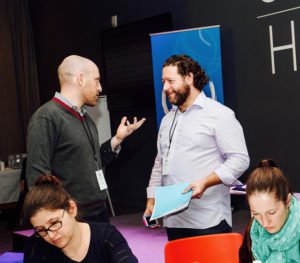The Lean Startup Methodology: A Conversation with Adam Berk, Cofounder of Neighborrow, Founder of the MilValChal, and PLC at Pearson.
 Berk’s background
Berk’s background
Adam Berk (@AdamBerk) is a lean entrepreneur, lean teacher, and Serial Entrepreneur. He is one of the more intrepid experimenters. He is currently an Implementation Coach at Pearson and Entrepreneur-In-Residence at The Entrepreneurial Science Foundation. In the past, he has founded or cofounded Neighborrow, Fotogether, and the MilValChal, which funds all startups at a $1,000,000 valuation if they conduct + submit 100 customer interviews within 50 days and use the funding to test a hypothesis (or multiple hypotheses). He holds a BA in Economics from Emory University.
Using Lean Startup Methodology to Identify the Certain “Je Ne Sais Quoi” in Entrepreneurs
Adam Berk isn’t one to shy away from admitting when endeavors don’t end up going his way. I applied [Lean Methods] to Neighborrow, probably five years too late. I guess I could say I am the rare case that I am almost glad that I did it the wrong way and didn’t apply it earlier.
Berk says Lean startup instantly made sense to him in terms of logic, but when his cofounder at Neighborrow first challenged him to run an experiment, he resisted the way many of my mentees and enterprise teams do now. The struggle Berk faced made him tough and a better mentor for future mentees.
Consequentially, Berk argues entrepreneurship’s cardinal sin is failure to learn. The je ne sais quoi that [differentiates the best entrepreneurs] is total learning– every other trait is a function of total learning. The other variables, which are functions of total learning, include fearlessness, capacity, autonomy, and speed.
Fearlessness leads to increased total learning, whether it be the courage to ship products earlier, challenge the status quo, even bending the law (whether it is Harvard law and you hack into the database and borrow some photos or San Francisco livery cab law) (including certain laws), or leave a comfortable job to work on one’s own idea.
One of the key attributes of successful entrepreneurs is the capacity to learn. Absence of this attribute nullifies the effectiveness of the other traits. Capacity to learn leads to autonomy for entrepreneurs, which leads to speed of learning. Part of the reason why so many entrepreneurs know how to code is not coding’s intrinsic value, but rather it’s [propensity] to increase speed of learning. The only way to saturate that capacity is by learning longer or learning faster.
Berk also challenges the importance of two traits traditionally linked to successful entrepreneurship: coachability and work ethic. Coachability and great work ethic increase capacity but coachability in and of itself is not necessarily the characteristic of a great entrepreneur. Coachability is one of the traits we are tracking now in our data this year. Coachability is necessary for a mentor-driven fund like ours but in my opinion it does not need to exist.
As for work ethic, Berk argues [an entrepreneur] is not likely to be a crazy success without a good work ethic. However, good work ethic alone will not cause success. Instead, it will lead to more cumulative learning, if initial capacity is the same.
In Berk’s opinion, velocity of learning is where lean startup plays the biggest role. Lean does not change the entrepreneur’s total capacity, it does not change the work ethic, and in most cases it does not change the coachability — but it changes the velocity of learning. This velocity of learning refers to proper implementation of the aforementioned (N) traits that are functions of total learning. If Lean is used properly, then it can accentuate the N traits to increase total learning. Conversely, if Lean isn’t used properly this velocity can actually do more harm than good, either by leading the venture in the wrong direction or producing a blind output.
The lessons I learned the hard way made me a better mentor both in the skills [I gained] and in the legitimacy that I did struggle the same way that I see founders struggling still. As a result, Berk is now more committed to identifying the true problem and understanding the requirements of the real world. Berk does both with his fund, the MilValChal, which seeks to invest in learning in very small amounts as opposed to investing in a market size, investing in a team, or traction.
Future Aspirations
When asked the question of what problem he would like to work on Berk quipped, world peace is a little too lofty. On a more serious note, Berk would like a solution to provide warnings or security built into transportation to supplement speed and cost. Self-cleaning apartments and a dishwasher that puts dishes back in the cabinets [would be nice too].
Berk is still trying to make Neighborrow and the sharing economy work to solve the problem of wasted goods, though he thinks 3D printing a drill may prove to be a better solution than borrowing one at this point. Fall in love with the problem, not the solution!
_____________
Notes and resources
http://www.fastcompany.com/3050775/the-sharing-economy-is-dead-and-we-killed-it
https://www.linkedin.com/in/startupfunding
Credit to Jonathan Bertfield and Tristian Kromer (@TriKro) for the function of learning and One Experiment Per Week“.
